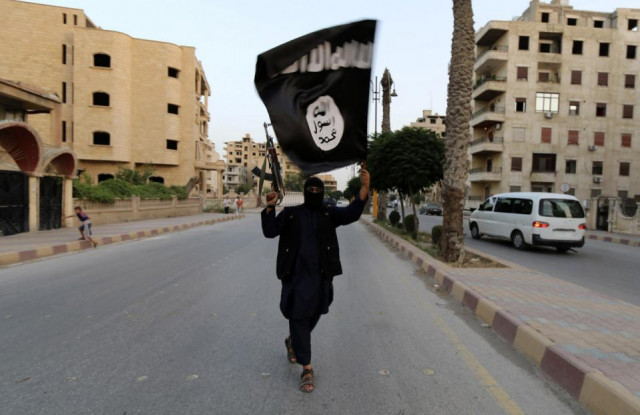IS and the Muslim world’s responsibility
The Paris terror attacks seem to have achieved their immediate objective. The world at large stands stunned

PHOTO: AFP

This is not to say that these far right groups have suddenly emerged on the scene in reaction to the Paris attacks. They have been present for decades. Their hateful narratives have actually only now become audible for the first time since 9/11. And these groups have been since making significant inroads in the political environs in Europe and the US. Now, in the first flush of reaction to the Paris attacks, their narratives seem to have become more strident.
However, what is reassuring is that even more vocal, more forceful and louder voices are being heard in the same societies, articulating ideas widely differing from the hate narratives. And even more reassuring is the fact that these counter-narratives are coming from the representatives of the majorities. President Francois Hollande of France, acknowledging that the “tragic events” had “sown doubts” in some people’s minds, called it a “humanitarian duty” to help the refugees. He has pledged that France will be taking in 30,000 more Syrian refugees. And displaying typical French zest for living, he has called for life to resume fully and asked: “What would France be without its museums, without its terraces, its concerts, its sports competitions?”
US President Barack Obama has been equally forceful in his exhortations: “We are not well served when, in response to a terrorist attack, we descend into fear and panic.” Good decisions, as he rightly said, are not made if based on hysteria or an exaggeration of risks. And responding to a couple of Republican presidential candidates who had called for offering shelter only to Christians and other non-Muslim refugees, President Obama fittingly retorted: “We do not have religious tests for our compassion.”
Despite these fair voices, the situation is likely to further deteriorate for the Muslim world and especially for those law-biding Muslims who live in Europe and the US if the IS and other fundamentalist groups spewing terror and barbarism around the world are not stamped out for good, and soon. Right-wing groups across Europe have characterised recent events as an ongoing conflict between the West and Islam. This is perhaps what the Islamic State wants. The terror group perhaps aims to incite a Western response it can later define as a ‘crusade’. If it can provoke the West into what it will call a crusade, it can perhaps count on growing support from marginalised Muslims, both in the Middle East and in countries such as Britain and France. Therefore, the first thing the civilised world — that would also include democratic Muslim countries, like Turkey, Pakistan, Malaysia and Indonesia — should be doing is to find fail-safe means to completely close off all taps that supply the IS with guns and gold. It would be advisable to discuss the issue with those 20 countries that President Vladimir Putin of Russia had recently identified as the IS’s main sources of funds and weapons. Next, since the motivating factor seems to be a flawed ideology, the Organisation of Islamic Cooperation should convene a summit to get both Saudi Arabia and Iran to come to some kind of arrangement to co-exist without using proxies to enhance their respective influence in the Muslim world, especially in the Middle East.
Published in The Express Tribune, November 23rd, 2015.
Like Opinion & Editorial on Facebook, follow @ETOpEd on Twitter to receive all updates on all our daily pieces.














COMMENTS
Comments are moderated and generally will be posted if they are on-topic and not abusive.
For more information, please see our Comments FAQ